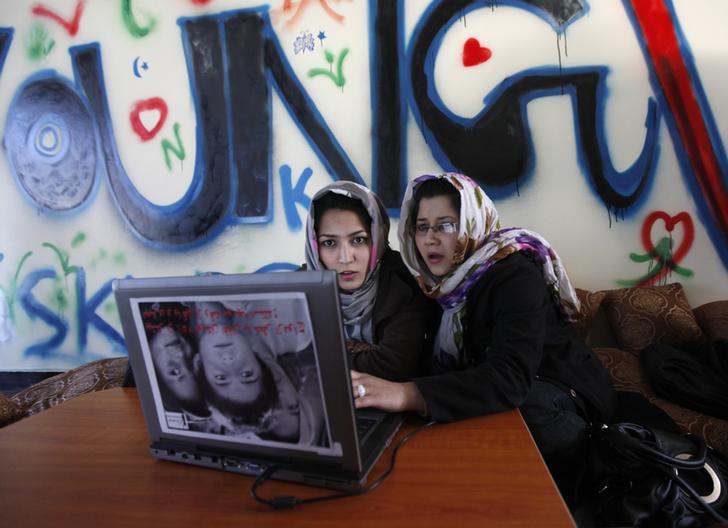“Yeah… I went too far,” he said, which by most accounts would be an understatement.
Among the Twitter comments this Internet troll posted to or about a female writer and activist were:
“Rape her nice ass.”
“I will find you.”
“The police will do nothing.”
The man, who agreed to be interviewed only under a pseudonym–we’ll call him Jim–said he did not start off with the intention of menacing anyone. Yet it is hard to imagine a public milieu where an individual might consider casually uttering such words–to a stranger no less.
Jim’s comments are, however, disturbingly representative of Internet trolling, a practice that has become a major concern for activists and journalists, particularly females.
A troll, or more specifically a cyber troll, is commonly described as a person who intentionally posts provocative messages to cause arguments or disruptions. The term has come to be applied broadly to a range of online behaviors, from those that are provocatively contrarian to others that are criminally menacing. Trolls may target specific individuals and they may stand out in a virtual crowd or operate like a mob, tearing apart anyone whose views, appearance, or attitude they don’t like.
Online hectoring directly affects nearly half the cyber community, according a 2014 study by the U.S.-based Pew Research Center,which found that 40 percent of Internet users have personally experienced mild to severe online harassment. Men are more often subject to insults online, according to the study, but forms of online abuse toward women tend to be far more severe, including sexual harassment and threats of violence. “The kinds of threats women get online are in sync with the real-world threats they face,” said feminist activist and writer Soraya Chemaly.
This special brand of online abuse is becoming a de facto occupational hazard for many female journalists. Sri Lankan journalist Sonali Samarasinghe describes the negative comments she has received online as typically criticizing not her words, but her womanhood. “One person wrote that I had no uterus,” she recalled.
Samarasingheis not alone. A March 2014 survey on violence and harassment against women in media conducted by the International News Safety Institute and the International Women’s Media Foundation found that a quarter of the work related-threats and intimidation directed at female journalists took place online.
Though the impact and prevalence of Internet abuse and trolling is increasingly well documented and aired in public forums, less is known about those who engage in it and why. The anonymity and fluidity of social media, and the fact that trolls come in many shapes and sizes, make it hard to pin down an archetype. “It’s really important to remember that underneath all their abuse, trolls are complex human beings just like the rest of us,” noted Claire Hardaker, a linguist at Lancaster University who has written extensively on trolls. “They can be women in their twenties, men in their twenties, or thirties, or sixties–mothers, fathers, privately educated, or from any walk of life at all.”
Despite their penchant for inserting themselves into online threads, contacting trolls directly for this report proved challenging. Many accounts had been shut down or banned and several trolls did not respond to or refused interview requests.

In a phone interview, Jim said that he began tweeting comments when he was a newcomer to social media exploring topics that were trending on Twitter. “I decided for some stupid reason to join in,” he said. Once the retweets and responses began flowing, he felt a strong personal validation and so embarked upon what soon became an ugly trajectory. His explanation of how that happened doesn’t fully account for the brutishness that resulted, but it does provide insight into the pull of trolling.
Another troll–though he does not approve of that appellation–who identifies himself on Twitter as @SageCommander, also known as John Blackout, calls himself an “irritant,” not a troll. “I like to ‘troll’ certain accounts, especially when they tweet something stupid,” he said in an interview via Twitter. “But I don’t consider myself a troll. My tweets are maybe 20% trolling.”
Blackout sees his online comments not as harassment, but as a needed counterweight to opinions and news items he believes are flawed. “I can make people uncomfortable when confronting them with their own positions,” he wrote. For him, it is dialectic without boundaries. “I might ask someone who considers themselves ‘pro-choice’ if they are ok with aborting babies at nine months so long as at least part of them is still in the mother. That isn’t trolling, it’s asking them to examine the courage and extremes of their position.”
For some, such comments border on, or cross over into, hate speech. While women are often victims of online aggression, some of the worst trolling targets race.
Andrew Auernheimer, as he identifies himself, also known as @rabide,and sometimes as weev, revels in the opportunity provided by social media and the blogosphere to tout his Aryan causes, among them #WhiteGenocide. “I’ve never harassed anyone in legal definitions, but some people see Aryan opinions as harassment,” he said in a phone interview. Though Auernheimer now focuses on nationalist and racist complaints, he said his interest in trolling escalated with the emergence in 2014 of #gamergate, an online campaign against several women in the gaming industry that spun into a rash of serious cyber harassment, including threats of violence and doxxing, the practice of revealing personal information, such as home addresses, online.
Auernheimerwas imprisoned for more than three years for hacking and identity fraud. On his account he has posted, “The thing I missed most in prison was Twitter. Seriously.” He said Twitter gives him an entrée he never had into the pop culture fray. Prior to Twitter, “there was not a single outlet to represent us; we were shunned by the mainstream.” He has more than 29,000 followers.
Auernheimerexplained trolling as a weapon in his war against “SJWs,” or Social Justice Warriors. One of its most powerful functions, he said, is to push the “Overton window”–a political theory developed by American public policy analyst Joseph Overton to describe the range of ideas the public will accept. Auernheimerclaims the numbers of likeminded “netizens” is growing. “It’s a great time to be a white nationalist!” he said.
Some efforts have been made in recent years to identify the social and psychological causes behind trolling. According to one study, “Trolls Just Want to Have Fun,” which looks into the personality traits of trolls, they are simply bad people. The study, published in 2014 by Canadian psychology academics Erin E. Buckels, Paul D. Trapnell, and Delroy L. Paulhus, found “trolling correlated positively with sadism, psychopathy, and Machiavellianism,” with sadism showing the most “robust” associations with trolling. “Cyber-trolling appears to be an Internet manifestation of everyday sadism,” the authors concluded.
But there is a danger, others contend, in marginalizing trolls as malevolent outliers or social aberrations. “It lends itself to a mythology, but in fact they are ‘normal,’ reflecting a dimension of human nature that is ugly,” said Chemaly, who writes on gender for The Huffington Post, the Guardian and other publications. Trolls frequently target women and, “The word itself evokes some little monster, but we are talking about the misogynists next door,” she said.
Trolling has become so pervasive that one U.K. insurance company offers policies that include coverage of the costs of legal action, relocation, and other actions necessitated by cyber bullying.
Whitney Phillips, author of the book This Is Why We Can’t Have Nice Things: Mapping the Relationship between Online Trolling and Mainstream Culture, argues that trolling is a manifestation of deeper societal problems, such as pervasive sexism. “This isn’t a ‘trolling’ issue, in other words, it’s evidence of a cultural sickness,” Phillips said in an email. “I would argue that more commonplace, everyday expressions of sexism are just as dangerous as more extreme, obvious examples of violent misogyny.”
Hardaker, the Lancaster University linguistics lecturer, agrees, though for different reasons, that viewing trolls through a more universal lens is the best approach to understanding their behavior. “Very few of us look at ourselves in the mirror that morning and say, ‘Today I’m going to attack a child online till they cry, self-harm, or even commit suicide,'” she said. “Instead, they’re likely to be thinking of their behavior in other, more socially acceptable ways–they’re correcting people who are wrong, they’re sticking it to the man, they’re righting a perceived wrong, they’re just being funny for their friends, and so forth.”
How, then, to deal with the problem of trolls, which sometimes threatens to escalate into actual violence? And at what point do gender-based trolling attacks actually encourage the kind of pervasive sexism Phillips evoked?
A handful of women have confronted their cyber persecutors successfully, either directly or through legal action. In 2014, Seattle-based writer and editor Lindy West wrote an open letter online to one of her trolls. Her antagonist had made derogatory comments while impersonating West’s recently deceased father. Surprisingly, the troll apologized via email. West chronicled the exchange for National Public Radio’s “This American Life” program, during which the two also spoke by phone. He explained that his actions stemmed from his offense at seeing a highly confident woman at a time when he was professionally frustrated and had recently broken up with a girlfriend.
“I think my anger towards you stems from your happiness with your own being,” he wrote in an email to West. “It offended me because it served to highlight my unhappiness with my own self. It is the lowest thing I have ever done.”
Women’s activist and writer Caroline Criado-Perez, whose campaign to put Jane Austen on Great Britain’s 10-pound note brought her a maelstrom of online rape and death threats, brought charges against two of her worst trollers, including a woman, Isabella Sorley. Both were jailed in January 2014 for making “extreme threats.” In a public apology on BBC, Sorley read some of her tweets aloud. They included “Rape is the last of your worries” and “Go kill yourself before I do.” She described her behavior as “utterly appalling.” “It’s disgusting, it’s venomous,” she said, and though she attributed it to alcohol, she admitted there must be more to it. “Am I mental? I’ve got to question,” she said in the interview.
The conventional wisdom, however, is that “feeding the troll” by responding or confronting him typically leads to more aggressive activities, rather than trolls’ remorse. Jim said he escalated the vehemence of his comments the moment his target began to snipe back, though he did not say why.
“They want attention. If you respond, they win,” is how University of Pennsylvania professor Anthea Butler sees it. Butler said she has had to block thousands of accounts due to hostile comments.
Those who troll often say that anyone unhappy with what is being said can simply leave the conservation. John Blackout said that in his opinion it is up to the individual user to draw the line of what he or she will tolerate. “Other people can decide whether to follow/fave/retweet/mute/block and control their own timeline,” he said.
For journalists, that is easier said than done, according to U.S. journalist and founder of TrollBusters Michele Ferrier, who chronicles her own experience with hateful readers elsewhere in this book. “If your job is being public as a journalist, you cannot avoid social media as part of your job,” she said. “It’s expected to be online in many capacities. Or if you are an independent online news provider, who are you going to call to step in for you?” Ignoring physical threats can be risky, she said. “There is no safe space online and limited recourse to just block or get off the computer.”
So the trolling continues. Jim said he plans to stop trolling, but whether he will manage to overcome the urge remains to be seen.
Elisabeth Witchel, a CPJ consultant, previously worked as the organization’s journalist assistance coordinator. She also launched CPJ’s Global Campaign Against Impunity.
